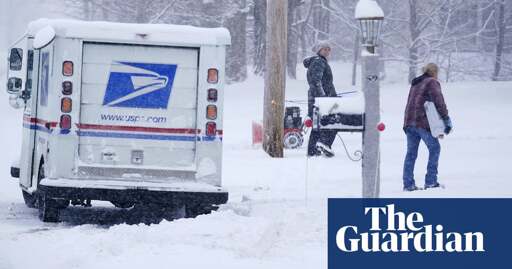Summary
Donald Trump is considering privatizing the US Postal Service due to its financial losses, a move that could disrupt shipping and push hundreds of thousands of federal workers out of government.
Citing the USPS’s financial losses, Trump argued the agency should not rely on government subsidies.
While his specific privatization plans remain unclear, Trump previously clashed with the USPS during his first term, attempting to shift control of key functions like labor relations and rate-setting to the Treasury Department.
This move could significantly alter the structure and operations of the USPS if implemented.



https://www.thefencepost.com/news/nbc-poll-75-of-rural-americans-support-trump/
That is about rural Americans, not Americans who live in areas that only the USPS is willing to serve. There is a massive difference.
I’m a rural American. You have to go down a country road and up a highway for about 10 minutes to get to the nearest town. UPS, FedEx and Amazon all deliver right to my door.
They are different, but one is a subset of the other.
And yet you have no evidence of how that subset voted.
You mistake evidence with ironclad proof. They are not the same.
No I haven’t. You’ve given neither. The aggregate of rural voters in the entire country says nothing about specific areas. It’s like saying everyone in Texas votes Republican based on overall results when there are large pockets that don’t.
Unless you’re going to maintain that all of those indigenous people in remote places who will be seriously hurt by this because they won’t be able to get basic things like medicine are Republicans. Because that sure seems to be what you’re suggesting.
Since I know you love this stuff… Take a group of 100 people. And ask them to pick A or B. 75% of them choose A. If you then pick a radom subset, the odds are that more than half picked A. Of course there exist subsets that didn’t. But that is just how percentages work. That would be evidence, but not proof. Because odds are the subset would have picked A over B, but it isn’t proof that the subset did. So. There is no particular reason to think that the subset of rural voters who have no ups and such are exceptionally different from all rural voters as a whole. They may be, but odds are they aren’t. Thus evidence, and not proof. Your implication is that rural voters who don’t have ups and such service voted more for Harris than Trump? He didn’t run on abolishing the usps. So why would that aspect make a difference? In general, rural voters are the ones that will be hurt most by trumps policies, yet per the link, they voted for him. See what I did there. I gave you the next thing to pivot to.
No, it is just not evidence. You are acting like political beliefs in rural areas are evenly-distributed when they absolutely are not.
Are you really suggesting that a very blue rural county in Vermont has people with the same politics as a very red rural county in Montana?
Otherwise, it’s simply not evidence of anything other than rural voters are more right wing in aggregate.
You can submit just about anything as evidence in court. So the bar to call something evidence is really low. Not sure why that’s the hill you want to die on when there are far better ones.
And you know I am not suggesting anything is uniform. But I was referring to an election result. So it’s just the percent that matters in the end.